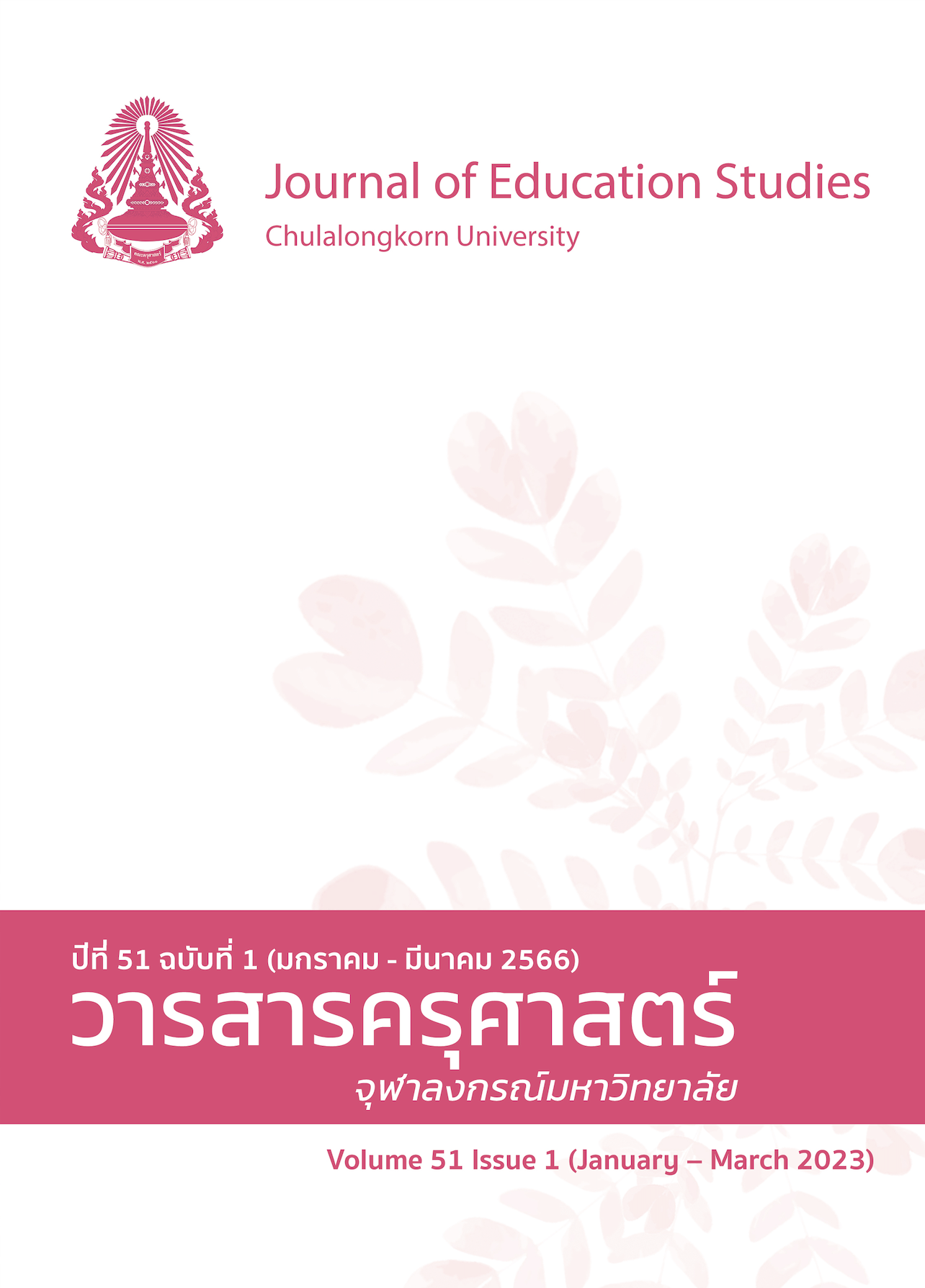Learning Achievement and Student Satisfaction in the STEM Education through Professional Learning Community in the Chemistry Class of Secondary School Students in the Southern Region of Thailand during Pandemic
DOI:
https://doi.org/10.14456/educu.2023.9Keywords:
STEM education, the Professional Learning Community (PLC) method, Secondary school studentsAbstract
The STEM education has not yet been implemented in schools, particularly those in the three southern border provinces. Consequently, the purpose of this research is to study the science learning achievement and satisfaction of students who learned with integrated learning activities based on STEM education designed by using the Professional Learning Community (PLC) method as a professional development tool. Secondary school students from four southern Thai schools who participated in the Science Mathematic Program (SMP) Special Classroom Project from a total of 120 students in those schools, 9 were chosen using a deliberative sampling method. The overall assessment results revealed that STEM activities used in the teaching and learning of chemistry subjects on the Solution concentration can increase students' interest in studying chemistry and their understanding of the learning content by displaying the mean scores and standard deviation of the scores from the STEM Learning Plan post-tests at the highest level. The E1/E2 efficiency of the STEM Education Program in Chemistry was 90.46/82.50, which was higher than the specified standard. We also discovered that the overall average was very high when we used the learning management plan to open a class to create the PLC process learning community. Furthermore, the effectiveness of establishing a professional learning community was rated favorably. However, factors other than academic achievement should also be investigated before applying to other subjects.
References
References
Ball, A., Joyce, H. D., & Anderson-Butcher, D. (2016). Exploring 21st century skills and learning environments for middle school youth, International Journal of School Social Work, 1(1).
https://doi.org/10.4148/2161-4148.1012
Banhan, A., Santiboon, T., & Somtua, T. (2017). Comparisons of the instructional management between STEM education method and the 5E-inquiry model for developing students’ creative thinking abilities and their attitudes toward Physics on momentum and collision issue of secondary students at the 10th grade level in Physics classes. European Journal of Education Studies, 3(5), 161-187. http://dx.doi.org/10.46827/ejes.v0i0.648
Fulton, K., & Britton, T. B. (2011). STEM teachers in Professional Learning Communities: From good teachers to great teaching. n.p.
Hafni, R. N., Herman, T., Nurlaelah, E., & Mustikasari, L. (2020). The importance of science, technology, engineering, and mathematics (STEM) education to enhance student’s critical thinking skill in facing the industry 4.0. Journal of Physics: Conference Series, 1521(4), Article 042040. https://doi.org/10.1088/1742-6596/1521/4/042040
National Institute of Educational Testing Service (Public Organization). (2020). Basic statistics of general subject test scores for the past 4 years. https://www.niets.or.th/th/content/view/799
Kennedy, T. L., & Odell, M. R. L. (2014). Engaging Students in STEM Education. Science Education International, 25(3), 246-258.
Khummanee, O. (2021). The development of supervision training course on stem education learning activities for private school teachers. International Journal of Crime, Law and Social Issues, 8(2). https://ssrn.com/abstract=3923149
Killian, M. P., & Bastas, H. (2015). The effects of an active learning strategy on students’ attitudes and students’ performances in introductory sociology classes. Journal of the Scholarship of Teaching and Learning, 15(3), 53-67. https://doi.org/10.14434/josotl.v15i3.12960
Landa, I., Westbroek, H., Janssen, F., Muijlwijk, J. V., & Meeter, M. (2020). Scientific perspectivism in secondary-school chemistry education: Integrating concepts and skills in chemical thinking. Science & Education, 29, 1361-1388. https://doi.org/10.1007/s11191-020-00145-3
Mayes, R., & Rittschof, K. (2021). Development of Interdisciplinary STEM Impact Measures of Student Attitudes and Reasoning. Frontiers in Education, 6(631684).
https://doi.org/10.3389/feduc.2021.631684
Pal, I., Sukwanchai, K., Bhuridadtpong, A., & Pal, A. (2022). Impacts of pandemic on education sector in Thailand. Pandemic Risk, Response, and Resilience, 457-469.
https://doi.org/10.1016/B978-0-323-99277-0.00016-4
Poonputta, A. (2021). Emotional, attitude and classroom action research competency conduction of undergraduate. Journal of Education and Learning, 10(6), 38-43.
https://doi.org/10.5539/jel.v10n6p38
Rahmawati, Y., Andanswari, F. D., Ridwan, A., Gillies, R. G., & Taylor, P. C. (2020). STEM project-based learning in chemistry: Opportunities and challenges to enhance students’ chemical literacy. International Journal of Innovation, Creativity and Change, 13(7), 1673-1694.
Ros, G., Rey, A. F., Calongue, A., & Lopez-Carrillo, M. D. (2021). The design of a teaching-learning sequence on simple machines in elementary education and its benefits on creativity and self-regulation. Eurasia Journal of Mathematics, Science and Technology Education, 18(1). https://doi.org/10.29333/ejmste/11487
Tomperi, P. T., Kvicesen, M., Manshadi, S., Uteng, S., Shestova, Y., Lyash, O., Lazareva, I., & Lyash, A. (2022). Investigation of STEM subject and career aspirations of lower secondary school students in the north calotte region of Finland, Norway and Russia. Education Sciences, 12, 192. https://doi.org/10.3390/educsci12030192
Tunkham, P., Donpudsa, S., & Dornbundit, P. (2016). Development of STEM activities in chemistry on “protein” to enhance 21st century learning skills for senior high school students. Silpakorn University Journal of Social Science, Humanities and Arts, 16(3), 217-234.
UNESCO. (2020). UN Secretary-General warns of education catastrophe, pointing to UNESCO estimate of 24 million learners at risk of dropping out. https://en.unesco.org/news/secretary-general-warns-education-catastrophe-pointing-unesco-estimate-24-million-learners-risk.
Downloads
Published
How to Cite
Issue
Section
License

This work is licensed under a Creative Commons Attribution-NonCommercial-NoDerivatives 4.0 International License.




